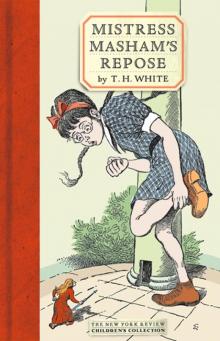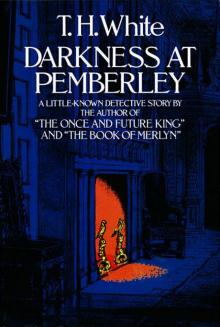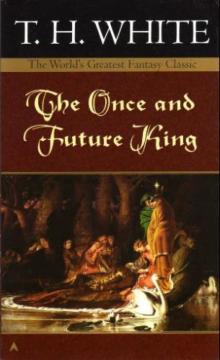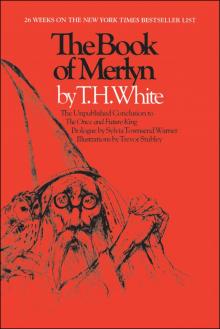- Home
- T. H. White
Mistress Masham's Repose Page 17
Mistress Masham's Repose Read online
Page 17
Captain, with his head on the knee, was gazing soulfully at his mistress with his eyes turned up like lollipops, while he gently dribble, dribble, dribbled on her apron. He used to get a sugar biscuit every night at bedtime, and this was why he was doing so. He was also thinking what a charming person Cook was, and wondering how on earth he could get along without her.
Alas, my poor Miss Maria, thought Cook between her nods; alack, my dowsabelle. But Rule Britannia is my motter, and while there is life there is hope. Supposing as which her old gentleman was lucky enough for to lay his hand upon her nest, according to the Scriptures, before them tryons has her imbrangled, which is what we must imprecate the Almighty Powers for the accomplishment of before the expiration of which, I wouldn’t be surprised but what there was some of them eternal hope-springs for the deliverance of whom, not with the aid of them Glorious Shiners which we wot of. Dearie me, dearie me. I’m sure I didn’t hardly have the heart to darn her little stockings....
She jerked her head upright for the fifth time, looked around with an expression which said: “I wasn’t asleep, so there,” and laid her spectacles on the work basket.
These saved, the sixth nod brought the tired head upon her chest, and she began to snore.
Poor Cook, thought Captain, I must be kinder to her. She makes a splendid pet. How faithful she is! I always say you can’t get the same love from a dog, not like you can from a human. So clever, too. I believe she understands every word I say. I believe they have souls, just like dogs, only of course you can’t smell them. It is uncanny how canine a human can be, if you are kind to them and treat them well. I know for a fact that when some dogs in history had died, their humans lay down on the grave and howled all night and refused food and pined away. It was just instinct, of course, not real intelligence, but all the same it makes you think. I believe that when a human dies it goes to a special heaven for humans, with kind dogs to look after it. It may be sentimental of me, but there it is. Poor things, why shouldn’t they? For that matter, I daresay there are humans in our own heaven even, for the dogs to make pets of. It would scarcely be heaven to some dogs, if they couldn’t take their humans with them. I know I should want to take Cook....
Captain suddenly lifted his head from the knee and looked at the distant door. The hackles rose on the back of his neck, and there must have been some setter blood among his ancestors, for he froze with his tail straight out behind him. His nose went whiffle-whiffle-whiffle.
In the huge arch of the doorway stood the miserable Schoolmaster, holding out a Lilliputian biscuit about the size of a daisy, and saying hoarsely: “Poor Fido, a good Fellow then! A fine Pug, Fido. A Comfit for poor Fido....”
The Schoolmaster was always chosen for difficult missions of this sort. His companions stood in the background, waiting to see how he would fare.
“Fido!” thought Captain with disgust. “Good Lord!”
He walked stiffly toward the door, to examine the intruder.
The poor Schoolmaster held the biscuit in front of him like a weapon of defense, shut his eyes tight, and kept gasping out his store of pacifications for Fido, while he was sniffed all over.
“It is the same shape as a human,” thought Captain, “in spite of the size, and it smells the same, too, only less. I think I will keep it for a pet, like Cook. I hope she won’t be jealous.”
So he picked the Schoolmaster up in a velvet mouth, and carried him to his basket, which stood beside the rocking chair. The Schoolmaster said faintly, “A poor Boy, then, a noble Fellow,” as he was transferred. He dropped the biscuit.
Now Captain was an elderly bachelor, and, like many people of this sort, he nourished an unconscious hope that one day he might have puppies. The size of the Schoolmaster must have suggested the matter to his mind, for he sat down carefully on the basket and arranged the Schoolmaster on his stomach. He prodded him with his nose several times, to shovel him into the right position, and the Schoolmaster said indignantly, “Leave me go, you nasty Br ...”
But, before he could say “Brute,” Captain’s tongue was slapped across his face like an outsize in custard pies, and, before he could say anything else, he was being given a bath. Captain knew very well that the proper thing with puppies was to lick them all over instantly, and this he proceeded to do, while the exasperated midget kept spluttering about Br-br-brutes. He even punched Captain on the nose, he was so annoyed, but his new mother took all in good part, and held him down with one paw, since he seemed to be fractious.
“Oh, you Creature! Down, Sir! Put me down! A bad Dog, Fido! Leave me down this Instant!”
Long afterward, while Captain snoozed contentedly in a loop, the damp Schoolmaster crawled cautiously from under his chin. He stood on tiptoe by the side of the basket and tugged the great gray curtain of Cook’s skirt.
“Yes, dear,” said Cook, without waking up. “You shall have it in a minute, my sparrow. Not before bye-byes.”
She thought that Captain was asking for his biscuit.
At the second tug she opened one eye.
She next opened both eyes, rubbed them, put on her spectacles, looked at the Schoolmaster, shrieked in a determined way, and resourcefully threw her apron over her head. Two minutes later, she lifted a corner, peeped out with the eye which she had used first, found he was still there, and replaced the apron.
“Madam ...”
Cook began drumming on the floor with her heels, to show that she intended to have hysterics if he did not leave off and go away.
The Schoolmaster stroked his clammy hair. “The Sex!” he thought wearily. “La! A very little Wit is valued in a Woman, as we are pleas’d with a few Words spoken plain by a Parrot.”
He turned his back, so that she could get accustomed to him in her own way, without meeting his eye.
Presently his sharp ears heard the apron being lifted for the third time, but he stood still, without speaking, and waited.
“Lawks!” said Cook.
“Madam, if you will pray compose yourself so soon as may be Convenient, I have the Honour to present myself upon Business of the most pressing Urgency.”
“A fairy!”
“A Sylph, Sylphid, Fay, Fairy, Genius, Elf, or Daemon, Madam, which you please, if you would kindly relieve me from the Attentions of Fido here or Shock, whatever the Animal may be named, and deeply oblige.”
Cook took her scissors out of the workbasket and lifted the tallow candle.
“I bid you begone,” said she, “by the Power of Iron and by the Might of Fire, forever and ever, by Christopher Columbus, and Whatsobe, Amen.”
The Schoolmaster turned round cautiously.
“The Effort to convince you of my Reality, Ma’am, would prove a Task beyond my moderate Powers at present. You will, however, permit me to observe that, whatever my substance, I am the Bearer of an urgent Message from Miss.”
“By Snip-Snap-Snorum and High-Cockalorum....”
He stamped his foot with vexation, causing Captain to give a growl.
“The Professor and Miss Maria are bolted in the Cellar!”
“Ladybird, Ladybird, fly away home. Your house is on fire, your chillun ...”
“What the Devil!” screamed the Schoolmaster, who had, after all, been tried rather high. “Z—ds! D—n the Ladybird! Plague on’t, Madam, can’t you understand plain English? We wish you to unbolt the Door!”
“Maria in the cellar?”
“Don’t you hear me, Ma’am (with a Pox), when I tell you that the Bolt is stiff? Must I e’en be slobber’d to death with Spittle and stifl’d by the filthy Carkass of your Monster, to be deafen’d with the Follies of Domesticks and exorcised under the Appellation of an Insect? Miss is in the Cellar, I say, and the Devil fly away with it!”
The Schoolmaster’s indignation was more convincing than any explanation could have been, and, as Cook felt certain that fairies were not accustomed to swear, she began to pay attention to his news. When she realized that it was about unbolting the dungeons
for the Professor and Maria, she gave up trying to understand why the visitor should be six inches high. Were he a spirit of grace or goblin dammed, she felt prepared to follow him, if it meant the rescue of her mistress.
She produced the bicycle from one of the smaller ovens, which she used as a garage, and seemed resigned when more and more of the Lilliputians began to filter into the kitchen. They had watched the proceedings of Captain from a safe distance, and now came forward, seeing that the embassy had been safely accomplished. There was a basket on the handlebars of the bicycle, into which she put several of them, at their request.
Captain wanted to carry the Schoolmaster in his mouth, and was dissuaded from this with difficulty. He ran behind when the expedition set off, anxiously watching the basket, for fear that his new puppy might fall out.
Cook pedaled down the Service Corridor at full speed, carefully ringing her bell at the corners. She propped the machine against the wall at the top of the cellar stairs, and hurried down the ancient steps as fast as her bad leg would permit. A crowd of the People were grouped around the bolted door. They had smoky torches, made from rushes dipped in mutton fat.
She was able to draw the bolt.
When the door flew open at last, it was to show the Professor and Maria at the end of the corridor, seated on the rack in the fading light of the electric torch, eating a hearty meal of small sheep and smaller loaves, which had been brought for them by the other party, through the broken window. The Professor was in high good humor, and had forgotten about being locked in.
“Ah, Mrs. Noakes,” he cried, waving a leg of mutton. “Come in, come in! Just in time to share our miniature repast! Something quite in your line, Mrs. Noakes, a piece of cookery which would interest the Goodman himself. The mutton positively melts in your mouth. Take a chair. No, there is no chair. Take a block, Mrs. Noakes. Allow me to help you to a couple of these hoggets. You will remember the extraordinary miscalculation made by Dr. Swift, when he was estimating the number of sheep that would be eaten daily by Surgeon Gulliver, on the island of Lilliput. I fear that the poor Dean must have confused himself with his cube roots. Sufficient, he says, my dear Mrs. Noakes, for one thousand seven hundred and twenty-eight Lilliputians. Yet, if a hungry Lilliputian could eat, say, one leg of mutton in a day, one thousand seven hundred and twenty-eight of them would eat the equivalent of two hundred and eighty-eight entire sheep. Do you suppose that you could eat two hundred and eighty-eight of these excellent hoggets in one day, Mrs. Noakes, hoggets, you will recollect, which the Dean himself describes as being of a size with larks, and eaten, as larks were eaten in his day, bones and all? Could you eat two hundred and eighty-eight larks in one day, Mrs. Noakes? No, no. Twenty-eight is more like it. The estimate must be ten times too high.”
Cook took no notice of all this nonsense. She rushed to her long-lost Maria, and folded her to the ample bosom.
While the hugging was being done, the Professor trotted off to find a convenient block for his old friend. He was determined that she should sample the mutton, and, after trying various makeshift seats, he fixed on an ancient chest which stood beside the Manacles. When he began to pull it across the floor, the lid opened. It was full of parchments.
“Dear me,” he exclaimed. “What a find! Somebody hold that torch. Why, here is a charter-hand script, Maria, which says that your ancestors were seized of the Castel of Malplace in the thirteenth century! And here is Castellum Male Positum, in a late Carolingian minuscule. But wait! What is this? My goodness, can it be ... I wonder ... Suppose one were to sue out a suit of mort d’ancestre, on the basis of this charter, with perhaps just a touch of praemunire, but particularly the mort d’ancestre, and suppose ... Dear me, this is extremely interesting! I think I will just take the liberty of putting this document in my pocket, Maria, so that I may work it out in full, at leisure.”
CHAPTER XXVII
IT was late at night, and two expeditions were plodding across the province which Maria’s ancestors had called a garden. The Vicar was pacing back from the distant Vicarage with his brace and bit, while Maria and the Professor were making their way in the opposite direction, along a different path, to the cottage. What with the rest which she had enjoyed, and the nourishing meal, she had flatly refused to be carried in the Boy Scout lift, to the Professor’s grief. He was consoling himself by telling her the names of stars, as they went. The moth wing of the Milky Way was gently glowing above their heads, which he claimed to be really the Milky Wey, except that people had got it muddled.
The time was nearly one o’clock in the morning, so that Sagittarius the Archer was lowly crossing the meridian, and the old gentleman told her how the hub of the Universe was situated near that constellation. They themselves were spinning round the sun, and the sun was spinning round the hub ten thousand times faster than an express train, and the hub at that moment was in its right ascension. Maria felt quite giddy with all the spinning, particularly as she had to walk with her head craned backward in order to admire the zenith. She felt as if she would soon begin to spin herself, till she whirled away in a powdery blue, to join the mealy bloom of nebulae.
At the cottage she was given a good dose of dandelion wine, and put to bed.
The Professor wheeled his tricycle from the coal shed when she was settled, fetched the curly bowler hat and the faded ulster to cover his shabby clothes, locked the front door, and hid the key as he had promised under the geranium. He looked at the window where Maria was already sleeping peacefully, and told himself that all was safe. It was high time to claim police protection on the score of bruises and handcuffs, and to lay an information against the villains of our story. Even if the Lord Lieutenant were in his Garter or his Bath, or in his bed itself, he would have to be waked without delay. “Speed!” cried the Professor, as he pedaled away. “Expedition! A stitch while the iron is hot! Never put off till tomorrow without a hap’orth of tar.”
When the Vicar reached the Palace at last, after his double journey, he and Miss Brown went down to the cellars at once, to set about the work of capturing the People. They stood staring at the open door in the light of the guttering candle, and the hum died to silence in the back of his nose.
“Gone!”
First he looked at Miss Brown, convinced that she had double-crossed him. But as she was looking at him with the same expression, each with a face as wicked as the other’s, they trusted one another instinctively. They went in hastily, and poked among the instruments of torture. They searched the other cellars. They sat down in the cobwebs on an empty barrel, and were silent for so long that the gray mice crept out once more to scamper through the dust.
Miss Brown spoke first.
“However they went, they are gone.”
“And the midgets.”
“He has taken her to the cottage, as he said he would when we were listening, and has gone for the constable on his tricycle, to lay a charge against us.”
“It was you who suggested the handcuffs.”
“Fool,” said Miss Brown.
She continued evenly: “The old dolt said that he would lock her in, and hide the key under his secret pot of pink geraniums.”
“What does it matter where he hides it? If we are to be arrested, and the dwarfs are lost ...”
“No need to be arrested.”
“How?”
“Nobody knows that Maria was here. She was thought to be away on a visit. We thought so ourselves.”
Her pebble eyes challenged him to contradict.
“We thought so ourselves. We told Cook. Yet we find that he has somehow or other managed to decoy her to his cottage. If she were found dead in that cottage, Mr. Hater?”
“I refuse to have anything to do with it! I will not be mixed up in an affair like this. It is too dangerous. It is impossible.”
“He locked her in when he left,” pursued Miss Brown, “and hid the key under the pot of pink geraniums, a secret spot known only to himself. His finger marks are on the key. Suppose
the key were in its place when he returned, with the police, and that the cottage were still locked, the key still finger marked? We only need to lift it carefully, in gloves.”
“I will not help.”
“In the locked house, which he confesses to have locked himself, the kidnaped child lies dead.”
“It is preposterous.”
“He will be judged insane, because he fetched the constable.”
“But, Miss Brown, this is a nightmare! There can be no possible reason for killing Maria, no chance of escape for ourselves if we did.”
“It is that or prison. If he is sane, there is his charge against us, with her evidence. If he is mad, and she is dead, we are at liberty.”
“But the minnikins!”
“You and your minnikins.”
She held the candle close to his face again, and the purple veins and the blue lips were pale.
“We could not do it.”
“We must go at once, or it will be too late.”
“I refuse. It is all too hurried.”
“We must get there first, whatever happens. Perhaps we can think of something better on the way.”
They stood up simultaneously, and left the cellar.
The dauntless Gradgnag—as usual, like Alan Quarter-maine, a dependable Watcher-By-Night—stepped from behind a wine bin when they had gone, and made all haste to climb the stairs. Everything depended on speed. The Schoolmaster and the Admiral would have to be found at once. Plans would have to be made for warning Maria, even for guarding her if possible, since the secret of the geranium pot was out. It seemed beyond the bounds of possibility that they could really mean to kill her, but the Professor would have to be warned also, wherever he was, and the police protection would have to be hurried.
Fortunately the main body of the searchers were still inside the Palace, for things had been happening quickly. The Schoolmaster was in the kitchen with Cook, where he was trying to explain to her the difference between himself and a fairy, now that the danger seemed to be over.

 The Once and Future King (#1-4)
The Once and Future King (#1-4) Once & Future King 05 - The Book of Merlyn
Once & Future King 05 - The Book of Merlyn Mistress Masham's Repose
Mistress Masham's Repose Darkness at Pemberley
Darkness at Pemberley The Once and Future King
The Once and Future King The Book of Merlyn
The Book of Merlyn Candle in the Wind
Candle in the Wind